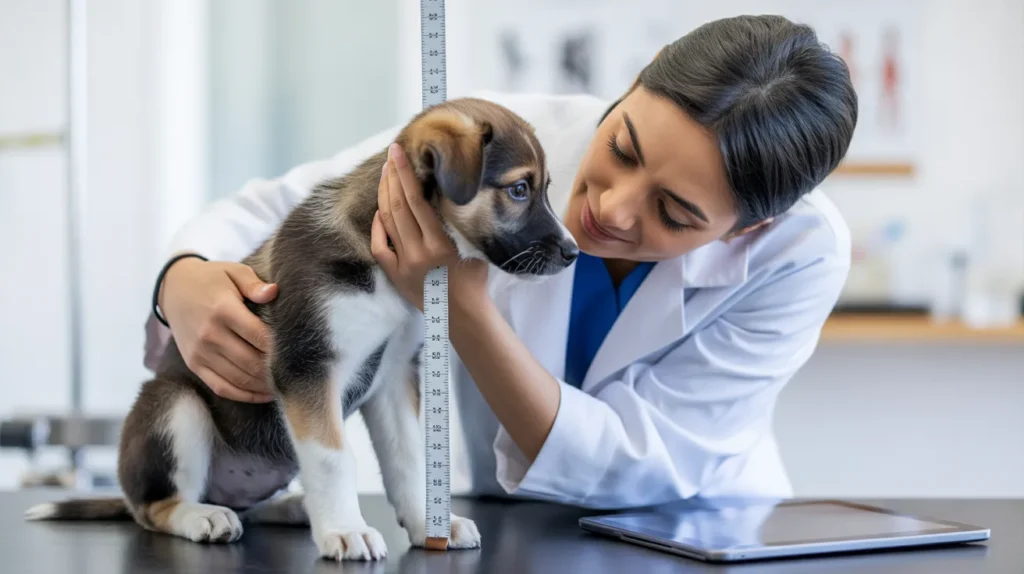How Fast Do Puppies Grow? A Complete Guide to Puppy Growth Stages
If you’ve ever brought home a playful little pup, you’ve probably wondered how fast do puppies grow. From tiny paws to strong legs and shiny coats, puppies go through incredible changes in just a few months. Understanding the puppy growth stages helps you know what to expect as your pet matures and ensures you support their development with the right care, diet, and exercise.

Content
Understanding How Fast Puppies Grow
Puppy growth is one of the most fascinating parts of owning a dog. The rate at which a puppy grows depends on its breed, genetics, and nutrition. In general, small breeds grow faster and reach maturity earlier than large breeds. For example, a small breed like a Chihuahua may reach full size within 9 to 10 months, while a large breed such as a Labrador Retriever or Great Dane may take up to 18 to 24 months to fully develop.
When you ask how fast do puppies grow, it’s important to remember that growth isn’t just about size. It’s about bones strengthening, muscles developing, and behavior changing. Puppies also learn to explore the world and develop social skills during this time.
Puppy Growth Stages Explained

To understand how fast do puppies grow, it helps to look at the major puppy growth stages:
1. Newborn to 2 Weeks – The Neonatal Stage
At this stage, puppies are completely dependent on their mothers. Their eyes and ears are closed, and they rely on warmth and milk. Growth during this time is rapid in weight but limited in activity.
2. 2 to 4 Weeks – The Transitional Stage
This is when puppies open their eyes and start responding to the world. They begin to stand, walk, and even wag their tails. This is an exciting time for owners to see early progress in the puppy development timeline.
3. 4 to 12 Weeks – The Socialization Stage
During these weeks, growth becomes more visible. Puppies grow stronger, more coordinated, and start to explore their surroundings actively. It’s also a key time for socialization with humans and other animals. If you’re tracking how fast do puppies grow, you’ll notice their weight can double or even triple during this period.
4. 3 to 6 Months – The Juvenile Stage
This is the most noticeable growth period. Puppies gain muscle, develop adult teeth, and start showing signs of their adult size. It’s common for owners to wonder how much does a puppy grow each month during this phase. The answer varies by breed, but many puppies gain about 5–10% of their body weight each week.
5. 6 to 12 Months – The Adolescent Stage
Your puppy is now entering the teenage stage. Growth slows down, but bones and joints continue to strengthen. This stage is also when dogs start reaching sexual maturity. For many medium breeds, this is when they approach their full height and weight.
6. 12 to 24 Months – Reaching Full Size
By this stage, your dog’s body is nearly or fully developed. Large breeds, like German Shepherds or Great Danes, continue to fill out and gain muscle even after a year old. This final stage answers the common question: when do puppies stop growing? For most dogs, it’s between 12 and 24 months, depending on breed size.
Read More About: Seal Point Cat
Factors That Affect Puppy Growth Rate
When figuring out how fast do puppies grow, several factors come into play:
1. Breed: Small breeds reach full size faster, while large breeds take longer.
2. Nutrition: A balanced diet supports proper bone and muscle development. Puppies need food formulated for their specific growth needs.
3. Genetics: Parent size and lineage play a major role in how big your puppy will get.
4. Exercise: Regular play and gentle activity promote muscle tone and coordination.
5. Health: Regular vet visits help ensure your puppy’s growth is on track and free from nutritional deficiencies or diseases.
Monitoring your puppy’s progress using a puppy growth chart is a great way to make sure they are developing normally.
Real-Life Case Study: Bella’s Growth Journey
Bella, a Golden Retriever puppy, was adopted at eight weeks old. Her owner, Sarah, kept a growth journal to track her progress. At two months, Bella weighed just 10 pounds. By the time she was six months old, she reached 35 pounds, showing clear signs of healthy development.
Sarah followed her vet’s advice and fed her a balanced puppy formula with high-quality protein and calcium. By 12 months, Bella weighed 55 pounds and had reached nearly her full height. Her coat was shiny, and her energy levels were high. This real-life example perfectly illustrates how fast do puppies grow when they receive the right nutrition and care.
Tips to Support Healthy Puppy Growth
If you want your puppy to grow properly, here are some practical steps to follow:
- Feed a diet designed for your puppy’s breed and age.
- Stick to a consistent feeding schedule to maintain steady energy and growth.
- Avoid overfeeding, as rapid weight gain can lead to joint problems.
- Provide safe toys and activities to encourage physical and mental development.
- Visit your veterinarian regularly for checkups and vaccinations.
By paying attention to these details, you can make sure your puppy grows at a healthy and steady pace.
When Should You Be Concerned About Growth?
While it’s normal for growth rates to vary, there are times when you should talk to your vet. If your puppy isn’t gaining weight, seems lethargic, or has limb deformities, it could indicate a health issue. Sometimes, growth problems are caused by nutritional imbalances or genetic factors. A vet can recommend the right diet or supplements to correct the issue.
Conclusion: How Fast Do Puppies Grow?
So, how fast do puppies grow? The answer depends on the breed, genetics, and care they receive. From newborns to fully grown dogs, each stage of puppy growth is filled with learning and joy. By understanding puppy growth stages and monitoring your dog’s development, you’ll ensure they grow into a strong, happy, and healthy companion.
Whether you have a small or large breed, watching your puppy grow is a rewarding journey. Keep their diet balanced, provide proper care, and enjoy every stage of their development — because puppyhood passes faster than you think.
If you love learning about unique pet genetics, check out our detailed guide on the Diluted Tortie Cat to discover what makes their coat so special.
FAQs About How Fast Do Puppies Grow?
How fast do puppies grow in a week?
Most puppies gain 5–10% of their body weight each week, depending on their breed and diet.
What is the 10 10 10 rule for puppies?
It’s a simple routine guideline suggesting 10 minutes of play, 10 minutes of training, and 10 minutes of rest daily.
What is the 7 7 7 rule for puppies?
This rule helps with socialization—by 7 weeks, a puppy should experience 7 new places, 7 people, and 7 different challenges.
What is the 3 3 3 rule for puppies?
It describes adjustment periods: 3 days to relax, 3 weeks to learn the routine, and 3 months to fully settle in.

Jerry takes a deep dive into the aquatic world. He’s your go-to for setting up the ideal fish tank, with expert advice on water quality and fish care.












